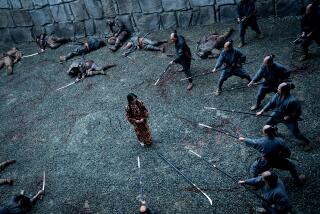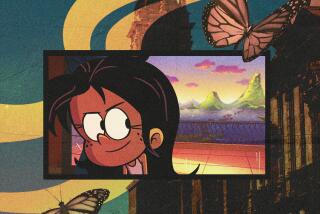‘Mononoke’ a Haunting, Magical World of Fantasy
- Share via
Animated it definitely is, but “Princess Mononoke” is no Disney movie, not even close. A $150-million-grossing phenomenon in its native Japan, the most popular home-grown film in that country’s history, it marries a remarkable sense of visual fantasy, both lyric and violent, with an ecology-themed story and complex characters. It’s an adult fairy tale, animation as we’ve not experienced it before--exactly what devotees of writer-director Hayao Miyazaki have come to expect.
Revered in Japan and overseas as perhaps the greatest artist of contemporary animation, Miyazaki and the company he co-founded in 1984, Studio Ghibli, have shown that more personal animation can reach the widest of audiences. His 1988 “My Neighbor Totoro,” for instance, was bested only by Kurosawa’s “The Seven Samurai” in a recent TV survey of favorite Japanese movies.
In “Princess Mononoke,” Miyazaki brings a very different sensibility to animation, a medium he views as completely suitable for straight dramatic narrative and serious themes. Though it has humor, there are no musical comedy figures in this film, no hummable Broadway show tunes. Instead, we are presented with a haunting, even unsettling magical mystery milieu of frustrated gods, angry spirits and overmatched humans in which images of startling beauty alternate with violent acts and nightmarish terrors as if that were the most natural thing in the world.
With themes that include death, duty, sacrifice and regeneration, as well as 16th century characters who say such things as “I remain and contemplate my death” and “I live here and listen to the pain of the forest,” “Princess Mononoke” is deeply rooted in Japanese society and tradition. As a counterforce, U.S. distributor Miramax hired Neil Gaiman, author of the adult comic series “Sandman,” to do the translation and hot young American actors such as Gillian Anderson, Billy Crudup, Claire Danes, Billy Bob Thornton and Jada Pinkett Smith to help domestic audiences surmount that considerable cultural gap.
One of the film’s prime terrors, an enormous and horrifying demon that takes the form of a fast-moving hellhound covered with writhing black snake-like feelers, appears almost at once, threatening a remote village where the last remnants of an exiled tribe called the Emishi are living out their lives.
*
The Emishi’s prince, a heroic young man named Ashitaka (Crudup), takes on the demon, who is prone to making such hair-raising threats as “Soon all will feel my hatred and suffer as I have suffered.” In the course of the battle, the demon slashes Ashitaka’s arm, and the tribal elders say the resulting infestation will surely kill him. Knowing that his fate cannot be altered but determined to go forth to meet it, Ashitaka leaves on his handsome red elk and vows to find the source of the small iron ball that apparently turned what was once a noble boar god into the demon that attacked the village.
Early in his journey, Ashitaka meets a wily priest named Jigo (Thornton), who has his own reasons for telling the young man about an enchanted wood presided over by the holy Great Forest Spirit, a deer-like creature with shimmering antlers and a human face who metamorphoses every evening into the towering Nightwalker.
But, despite the presence of happy-face tree spirits called kodama, all is not tranquil in this forest (which brings to mind leafy Japanese Shinto shrines such as Ise). Forces coexist within it that are eager for one another’s extermination, and once he arrives, Ashitaka meets them all.
First encountered, with blood on her face from sucking the poison out of a wound, is Princess Mononoke, familiarly known as San (Danes). A human girl raised by the giant white wolf god Moro (Anderson), whom she rides like a diminutive jockey, San is strong, feisty and contemptuous of all humans, most especially the Lady Eboshi.
As voiced by Minnie Driver (the “Tarzan” veteran who seems to do her best work in animated films), the Lady is the film’s most complex creation, difficult to pigeonhole as either good or evil. Cool, enigmatic, fearless, she has founded an iron-making city that has provided a good living and a rare sense of self-worth for societal outsiders such as brothel girls (Pinkett Smith is their spokeswoman) and lepers. But her iron-making process is destroying the sacred forest that is home to the gods, and it’s the iron bullet she manufactured that turned the boar god into that awful demon.
*
Ashitaka, who admires what the Lady has done and is attracted to Sen, tries to mediate between these groups as well as deal with the nefarious plans of Jigo, but this proves extremely difficult. Many of the old animal gods simply despise humans across the board, and the Lady is equally implacable in her ambitions. Given characters who believe “the world is cursed, life is hard, but still you find a reason to keep living,” it’s fitting that everything points to a troubling “Twilight of the Gods” conclusion that is neither tidy nor simplistic.
Director Miyazaki, who seems to literally breathe fantasy, works in a clean, fluid style that is not afraid to be dark but also takes pleasure in light pastel colors. A legendary perfectionist who avoided computer-generated work until this film and still personally retouched 80,000 of the film’s 1,440,000 animation cels, he creates a self-contained world that could not exist without animation, and a more satisfying use of the medium would be difficult to imagine.
(BEGIN TEXT OF INFOBOX / INFOGRAPHIC)
* MPAA rating: PG-13, for images of violence and gore. Times guidelines: much more intense and unsettling than typical Disney animation.
‘Princess Mononoke’
Gillian Anderson: Moro
Billy Crudup: Ashitaka
Claire Danes: San
Minnie Driver: Lady Eboshi
Billy Bob Thornton: Jigo
Jada Pinkett Smith: Toki
Tokuma Shoten Nippon Television Network, Dentsu & Studio Ghibli present a Studio Ghibli production, released by Miramax Films. Director Hayao Miyazaki. Producer Toshio Suzuki. Executive producers Yasuyoshi Tokuma, Bob Weinstein, Harvey Weinstein, Scott Martin. Screenplay Hayao Miyazaki. English-language adaptation Neil Gaiman. Editor Takeshi Seyama. Music Joe Hisaishi. Running time: 2 hours, 13 minutes.
At selected theaters.
More to Read
Only good movies
Get the Indie Focus newsletter, Mark Olsen's weekly guide to the world of cinema.
You may occasionally receive promotional content from the Los Angeles Times.









